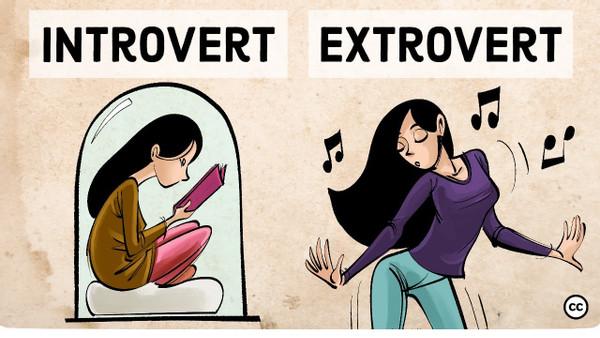Explore the World's Best Ideas
Join today and uncover 100+ curated journeys from 50+ topics. Unlock access to our mobile app with extensive features.
Carl Jung on introverts and extraverts
Carl Gustav Jung coined the terms introversion and extraversion in the 1920s. According to Jung:
- An extravert wants intensive contact with the outside world.
- An introvert turns the psychic energy inwards.
Yet no one is 100% extraert or introvert. Most people tend to one or the other side.However, iff both characteristics are equally present, they have an ambivert personality.
34
427 reads
Hans Eysenck's ideas
In the 1960s, Hans Eysenck added to Jung's ideas. He thought the main difference between introverts and extraverts lies in how they recharge their mental energy.
- Introverted people have a higher level of brain activity and need to protect themselves from too much external stimuli. They gain mental energy by withdrawing themselves.
- The extravert has less neuronal activity. They overcome this lack by exposing themselves to external stimulation, which charges their inner batteries.
36
324 reads
Introverts are not shy
Introverts may walk away from small talk to recharge, but that doesn't mean that they are shy.
They may not be afraid to talk to anyone, but when too many people are around and the conversation becomes superficial, they get tired. One strategy is to withdraw and recharge through silence.
36
326 reads
Extraverts and introverts use different brain areas
Some experts state that extraverts and introverts use different brain areas to form their ideas. An extravert relies on short term memory and can come to fast associations and ideas. But they often speak before they think.
An introvert retrieves information from long-term memory. Their thoughts are more complex and need time to develop. That is why they think first before they speak.
37
271 reads
Developing the strengths of extraverts and introverts
Good teachers are aware of the differences between extraverts and introverts and try to develop their strengths.
They help extraverts to learn to formalise their thoughts before they speak and introverts to get more talking time to practice their public speaking.
Group projects can support both temperaments. Extraverts can learn how to develop more complex thoughts while introverts can learn to think and speak more flexibly.
32
281 reads
IDEAS CURATED BY
Cayden X.'s ideas are part of this journey:
Learn more about psychology with this collection
How to adapt to different speaking situations
How to engage with an audience
How to use body language effectively
Related collections
Similar ideas
3 ideas
Reggio Emilia Education
Sprouts
3 ideas
The Pygmalion Effect
Sprouts
Read & Learn
20x Faster
without
deepstash
with
deepstash
with
deepstash
Personalized microlearning
—
100+ Learning Journeys
—
Access to 200,000+ ideas
—
Access to the mobile app
—
Unlimited idea saving
—
—
Unlimited history
—
—
Unlimited listening to ideas
—
—
Downloading & offline access
—
—
Supercharge your mind with one idea per day
Enter your email and spend 1 minute every day to learn something new.
I agree to receive email updates



